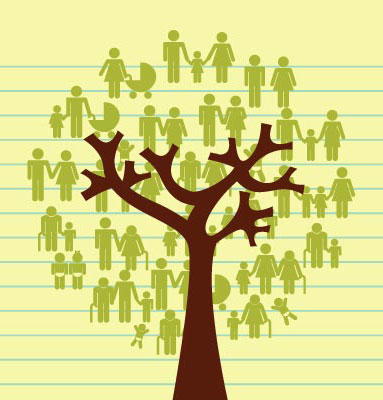Understanding your family history of cancer can help determine whether to get genetic testing, more frequent screenings or preventive care next.

Genetic vs. hereditary vs. family history
“The terms ‘genetic’ and ‘hereditary’ are often used interchangeably. But they don’t have the same meaning,” said Jonathan Ploeger, a Marshfield Clinic Health System genetic counselor.
Cancer is a genetic disease. That means it’s caused by changes in our genes that control how cells function. Genetic changes can happen during someone’s lifetime, or they can be passed down from parents (hereditary).
Some, but not all, genetic conditions are hereditary.
“If you have a hereditary disease, your parents may be carriers or affected by the disease as well,” Ploeger said.
Scientists can pinpoint several inherited genetic differences that predispose people to certain cancers. For example, breast, ovarian and colorectal cancers are sometimes related to a hereditary cause.
Diseases that are common in your family may not be caused by inherited genetic changes. This is called familial – factors shared among families, like environment and lifestyle.
Sporadic diseases don’t have an inherited genetic component and aren’t common in your family.
It’s important to know genetics is a growing field; we don’t know every gene associated with cancer risks. When there is a strong family history of cancer but no identified genetic cause, you should follow screening guidelines. Reach out to your provider for any suspicious symptoms.
Why know my family history?
A thorough family history is the first step needed to shed light on if you’re at greater risk for certain cancers.
For some genetically linked cancers, family history helps guide management, treatment and screening.
For instance, if you’re high risk for breast cancer because of family history, you may need a breast MRI and a mammogram. Similarly, if you have a family history of colon cancer, you may need more frequent screening at a younger age.
Ask these family history questions:
- How old was each family member when diagnosed with cancer? Cancer at a young age is a red flag that a genetic connection may exist.
- Have the same cancers appeared in more than one generation of your family?
- Where in the body did the cancer start? Cancer can spread, but the only genetic connection is to where the cancer originated. For example, maybe someone had lung cancer, but the cancer started in the prostate.
- Have family members had genetic testing? It’s vital to get specifics from family members. Ask for a copy of the test report and take it to your doctor.
Share your health history
If you’ve had cancer, let your relatives know what you can about it, including where it started. Sometimes people don’t realize some cancers that sound very similar are different. For example, ovarian and uterine cancers are not the same.
If you’ve had genetic testing, consider sharing your report with family members. That means sharing not only with your kids but your third cousin, too. If you’re related by blood, you’re connected by genes.
“A gene is like an instruction manual,” Ploeger said. “You could have a typo on page two or you could be missing a whole page. That mistake can be present in other family members carrying the same genes. If we know a family member’s detailed history, it helps us pinpoint potential cancer risks sooner. It also leads to more cost-effective testing with more accurate results.”
Small families, unknown histories
If your family is small, you’re adopted, or if you just have missing “branches” in your family tree, think about what you can do moving forward.
Write down your own medical history and share it with your kids and grandkids.
Reasons to get genetic testing
Genetic testing isn’t always needed when you have a family history of cancer. Some examples of when genetic testing is recommended may include:
- Early onset of the disease: Diagnosis before age 50 is considered early onset for most cancers.
- Multiple generations affected by the same type of cancer.
- Cluster of rare cancers in the family.
- Personal or family history of multiple primary cancers diagnosed in the same person.
Practical steps after genetic testing
A test that shows a genetic difference that puts you at greater risk for a certain type of cancer doesn’t mean you’re destined to get sick. Maintaining a healthy lifestyle can reduce anyone’s risk of cancer. If testing shows there isn’t a known genetic risk factor for a disease that’s common in your family, it’s still important to keep track of your family history.
For questions about cancer care, talk to a Marshfield Clinic Health System provider.
Find a Cancer Care & Research provider Learn more about Cancer Care & Research
Related Shine365 articles
BRCA1 and BRCA2: Key players in cancer prevention






Leave a Reply